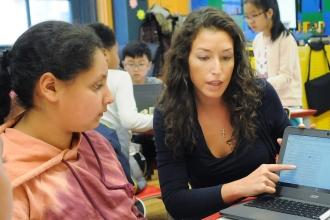Teacher To Teacher
Using memoirs helps students understand the Holocaust
Lisa Berke, an English teacher at Edward R. Murrow HS in Brooklyn, teaches a course on Holocaust literature through the lens of memoir because she believes in its ability to cultivate empathy.
Virtual learning for early childhood students
Early childhood educators face a unique challenge with remote learning. In our classrooms, learning occurs through hands-on experiences guided by an intentional facilitator. How can we recreate this virtually?
Assessing effectiveness of remote learning
Is remote learning effective? Here are some ways to find out.
Civics amplifies students’ voices
Participating in civics gives students the ability to champion causes, organize, disseminate information and influence public opinion. And through civic experiences, they learn they have a voice.
Building discussion in your math classroom
When I became a middle school math teacher 12 years ago, one of the first things I noticed was how chatty students can be. So I was surprised when, after I asked my students to discuss a math problem, strategy or solution with their group members, the room would suddenly get quieter.
No reason to blow off STEAM
If you are an educator without any formal training or background in science, being told to teach STEAM (science, technology, engineering, art and mathematics) may seem daunting. There’s the fear of the unknown, the fear of failure, the fear of not being able to tackle it all.





